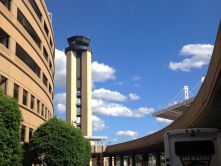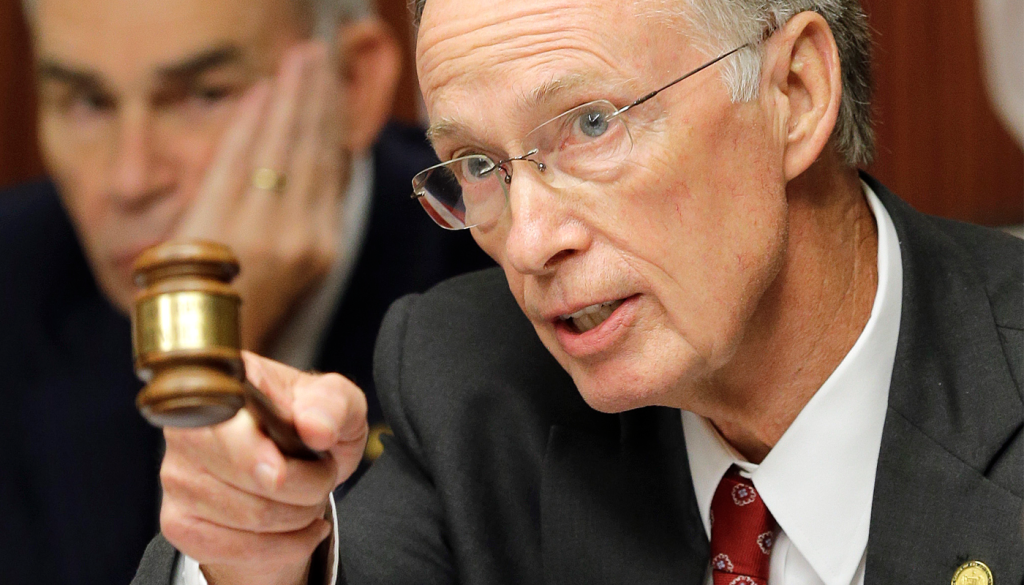Secretary Pete Buttigieg in Birmingham to announce $14.5 million federal grant to revitalize Alabama’s ‘Black Main Street’

U.S. Transportation Secretary Pete Buttigieg came to Birmingham on Wednesday to celebrate a $14.5 million federal grant that will restore two-way traffic to Fourth Avenue North in the city’s historic Black business district. “We’re here because everybody recognizes all the ways in which infrastructure shapes our lives, and we feel it when something goes wrong,” he said. “Sometimes we don’t pay attention to it when everything goes right, but a lot of work goes into making sure that it goes right. And that’s what today is about.” The grant comes from the U.S. Department of Transportation’s Neighborhood Access and Equity Grant Program, which is designed in part to help reconnect underserved communities that were adversely affected by past transportation projects. Buttigieg was joined by Congresswoman Terri Sewell, Birmingham Mayor Randall Woodfin, community leaders, and Fourth Avenue business owners for an event outside the historic Carver Theatre, home to the Alabama Jazz Hall of Fame and near the Birmingham Civil Rights District. The transportation secretary said his visit was “about better infrastructure for the future” and “about putting right things that have been done wrong in the past.” “Part of what brings me to Birmingham today is recognizing the consequences of infrastructure decisions that were made generations ago and our regard for a community’s vision,” Buttigieg said. The grant will restore two-way traffic along 15 blocks of Fourth Avenue and add additional features designed to revitalize the commercial district and help reconnect the important corridor to the broader neighborhood. “People are going to find it easier and more comfortable and safer to move on this quarter, whether walking, biking, riding the bus, or driving,” Buttigieg said. Sewell said many past infrastructure projects created barriers between people and adversely impacted neighborhoods, especially in African American communities. She said what happened to the Fourth Avenue business district – the city’s “Black Main Street” – is a prime example. “We know that the historic Fourth Avenue business district has a very rich legacy of African American ingenuity and entrepreneurship. We also know that we’ve seen the crippling effects of infrastructure policy that has sought to divide us,” she said. “Our people deserve better,” Sewell added, saying the project will “… help us right these wrongs and level the playing field for Fourth Avenue business district.” Woodfin said that to create a thriving downtown and thriving neighborhoods, “we need streets where a mother can safely push a stroller across a crosswalk.” “Our vision is to create a truly multimodal, model city, a city where people can walk, ride public transportation or ride a bike to get to their destination.” He said some of the changes won’t happen overnight, with many in the community still “trapped in a culture of car dependency.” “It will take us some time to undo this infrastructure and redesign our streets and systems,” Woodfin said, calling the Fourth Avenue project a “major step” in creating safer streets. Republished with permission from Alabama News Center. A version of this story originally appeared in The Birmingham Times.
Richard Shelby announces $12.5 million for statewide airport infrastructure upgrades

Senator Richard Shelby announced today that 25 local airports throughout Alabama will benefit from more than $12.5 million in Federal Aviation Administration (FAA) grants. The funding was awarded by the U.S. Department of Transportation (DOT) for various airport improvements to support infrastructure construction and safety advances. “I am pleased that DOT recognizes the importance of investing in these 25 airports,” stated Shelby. “The state of Alabama’s aviation industry is rapidly growing, and these safety and security advancements and infrastructure upgrades will be transformative. I look forward to seeing how this $12.5 million helps many of our airports better serve their communities and contribute to local economies.” The FAA grants are administered through the Fiscal Year 2022 (FY22) Airport Improvement Program (AIP), which was funded in the FY22 annual appropriations package that was signed into law in March. The 26 grants were awarded to 25 local airports in Alabama, amounting to $12,508,131 for the following airport projects: Huntsville Executive Airport-Tom Sharp Jr. Field, Huntsville, Alabama – $1,575,000 to construct, extend and improve a safety area Greensboro Municipal Airport, Greensboro, Alabama – $1,063,373 to rehabilitate a runway Dothan Regional Airport, Dothan, Alabama – $1,022,974 to reconstruct a taxilane Birmingham-Shuttlesworth International Airport, Birmingham, Alabama – $1,003,180 to construct, extend, and improve a safety area Florala Municipal Airport, Florala, Alabama – $850,000 to construct an apron and taxiway Montgomery Regional Airport-Dannelly Field, Montgomery, Alabama – $800,720 to conduct a study and rehabilitate runway and taxiway lighting Southwest Alabama Regional Airport, Thomasville, Alabama – $716,400 to construct a new airport Gulf Shores International Airport-Jack Edwards Field, Gulf Shores, Alabama – $670,000 to conduct a study and reconstruct taxiway lighting Wetumpka Municipal Airport, Wetumpka, Alabama – $560,285 to reconstruct a taxilane Carl Folsom Airport, Elba, Alabama – $540,263 to reconstruct a taxilane Marion County-Rankin Fite Airport, Hamilton, Alabama – $461,827 to install perimeter fencing Thomas C Russell Field Airport, Alexander City, Alabama – $461,238 to expand an apron and reconstruct a taxilane South Alabama Regional Airport-Bill Benton Field, Andalusia, Alabama – $457,163 to seal runway and taxiway pavement surface and pavement joints Birmingham-Shuttlesworth International Airport, Birmingham, Alabama – $360,000 to acquire an aircraft rescue and firefighting vehicle Sylacauga Municipal Airport-Merkel Field, Sylacauga, Alabama – $300,000 to acquire land for development Craig Field Airport, Selma, Alabama – $263,584 to strengthen a taxiway Jackson Municipal Airport, Jackson, Alabama – $210,000 to rehabilitate a taxiway Ozark Airport-Blackwell Field, Ozark, Alabama – $185,571 to seal apron pavement surface and pavement joints Talladega Municipal Airport, Talladega, Alabama – $166,053 to rehabilitate a taxiway H. L. Sonny Callahan Airport, Fairhope, Alabama – $150,000 to acquire land for development Monroe County Aeroplex Airport, Monroeville, Alabama– $150,000 to update the airport master plan Roanoke Municipal Enloe Airport, Roanoke, Alabama $150,000 to install an airport beacon Cullman Regional Airport-Folsom Field, Cullman, Alabama $148,500 to update the airport master plan Anniston Regional Airport, Anniston, Alabama – $108,000 to improve airport drainage and erosion control Foley Municipal Airport, Foley, Alabama – $72,000 to update the airport master plan Bay Minette Municipal Airport, Bay Minette, Alabama – $62,000 to install perimeter fencing
Richard Shelby secures more than $4.3 million for 5 Alabama airports

Sen. Richard Shelby announced today that five local airports in Alabama will benefit from more than $4.3 million in Federal Aviation Administration (FAA) grants. The funding was awarded by the U.S. Department of Transportation (DOT) for various airport improvements to support infrastructure construction, safety advances, and land acquisition. “I am proud Alabama is receiving $4.3 million in federal funding to enhance the development of our airport infrastructure,” stated Senator Shelby. “These five grants are important investments in the safety, efficiency, and expansion of large and small airports around our state. Further, local communities will be directly impacted by these advancements, which will help improve the quality of life for residents, increase tourism, and drive development.” Shelby stated on Twitter, “I am proud that the @USDOT is granting $4.3M in FAA funding to enhance the development of our airport infrastructure. These grants are important investments in the safety, efficiency, and expansion of large and small airports around our state.” @FAANews The 5 grants were awarded to local airports in Alabama, amounting to $4,300,365 for the following airport projects: Mobile Downtown Airport, Mobile, Alabama – $1,330,515 to construct, extend, and improve safety areas Montgomery Regional Airport-Dannelly Field, Montgomery, Alabama – $1,171,544 to rehabilitate an apron Bill Pugh Field Airport, Russellville, Alabama – $1,066,541 to rehabilitate a runway and runway lighting Monroe County Aeroplex Airport, Monroeville, Alabama – $385,146 to acquire land for development Bessemer Airport, Bessemer, Alabama – $346,619 to rehabilitate a taxiway and taxiway lighting
Robert Bentley paramour Rebekah Mason behind effort to shut DMV offices in black counties, new report shows

Rebekah Mason, Gov. Robert Bentley’s former top adviser and illicit lover, pushed to close 31 offices of the Alabama Department of Motor Vehicles in mostly black counties. After protests by civil rights activists, including Jesse Jackson, the politically motivated effort was later overturned, resulting in a federal investigation. The relationship between Bentley and Mason and how it impacted the DMV closure plan was the focus of a new 131-page report, which the Birmingham News reports was released by investigators examining impeachment proceedings against the governor. The report, from lead investigator Jack Sharman, found Mason “proposed closing multiple driver’s license offices throughout the State” and asking Alabama Law Enforcement Agency to “put together a plan.” Sharman also noted that former ALEA head Spencer Collier – well-aware of Mason’s intent – was instructed to have a plan “rolled out in a way that had limited impact on Government Bentley’s political allies.” Collier reported the closure plan to Luther Strange, Alabama’s then-Attorney General, expressing concern over possible Voting Rights Act violations. The News reports that Collier eventually agreed to the closure plan, but through “objective measure based on processed transactions per year to determine which offices to close.” Mason’s plan, if enacted, would of save the state $200,000 – a small amount in a General Fund showing typical annual shortfalls between $100 million and $200 million. Bentley agreed to the plan, the report said, with a single exception: removing state Sen. Gerald Dial’s district from the list. Dial told the News he never spoke with Bentley about any closures and is not aware of which county was under consideration. The plan set off an investigation by the U.S. Department of Transportation, which discovered that the closures would hit rural counties hardest and disproportionately affect black neighborhoods, a violation of the 1964 Civil Rights Act. The NAACP, the nation’s leading civil rights organization, filed a lawsuit prompting the federal review. At first, Bentley was critical of DOT involvement in the investigation, which he said was political in nature. But after striking an agreement between state and federal agencies, ALEA agreed it would extend service hours for DMV offices in Alabama’s so-called “Black Belt.”
U.S. agency orders corrective action after gas pipeline spill

Fuel supplies in at least five states are threatened by a gasoline pipeline spill in Alabama, and the U.S. Department of Transportation has ordered the company responsible to take corrective action before the fuel starts flowing again. Colonial Pipeline Co. must conduct testing and analysis on the failed section of the pipeline, according to the department’s Pipeline and Hazardous Materials Safety Agency, which is investigating the spill in rural Alabama. The company has acknowledged that between 252,000 gallons and 336,000 gallons of gasoline leaked from a pipeline near Helena, Alabama, since the spill was first detected Sept. 9. It’s unclear when the spill actually started. The pipeline section that failed runs from Mississippi to Atlanta. The agency said the spill is “within an unusually sensitive ecological area” and it ordered Colonial to take action “to protect the public, property and the environment from potential hazards.” “The department will remain on site to carry out its investigation, and make sure the operator is taking the necessary steps to prevent any future incidents,” agency administrator Marie Therese Dominguez said in a statement. In a statement Saturday, the Alpharetta, Georgia-based company said that repair work had begun in an effort to return the pipeline to service “as rapidly and safely as possible.” The company said it is shipping as much gasoline as possible on its distillate mainline, or Line 2, in order to mitigate the impact of the pipeline that has been shut down. Colonial earlier said most of the leaked gasoline is contained in a retention pond near the city of Helena and there’s no public safety concern. In response to the shutdown, the governors in Alabama, Georgia and Tennessee announced they would lift restrictions on the number of hours that truck drivers delivering fuel can work, in hopes of preventing fuel shortages. Governors can suspend federal transportation regulations during emergencies. A spokeswoman for Alabama Gov. Robert Bentley said Friday that he’s in communication with pipeline company officials along with state and federal officials assisting at the spill location. Georgia Gov. Nathan Deal said he was confident his order lifting restrictions for drivers would help. “We are confident these measures will help ensure Georgians’ uninterrupted access to motor fuel until Alabama’s pipeline is fixed,” Deal said in a statement. Tennessee Gov. Bill Haslam said his order was a precautionary measure. “We are not currently seeing any widespread unavailability of petroleum in Tennessee,” Haslam said in a statement. “We urge Tennesseans to maintain their normal fuel purchasing and driving patterns to help prevent any potential impacts on our fuel supply while the pipeline undergoes repairs.” The U.S. Environmental Protection Agency waived requirements this week that metro areas with air quality issues in Georgia and Tennessee use a cleaner-burning type of gasoline during the summer months. That requirement of the Clean Air Act expired at midnight Thursday. Republished with permission of the Associated Press.
Robert Bentley says UDSOT investigation a “weak attempt to embarrass” Alabama

Gov. Robert Bentley came out with a strongly worded statement against the federal Department of Transportation’s ongoing investigation into the state of Alabama’s recent changes to its driver’s license regime in the wake of budget cuts in Montgomery. The second-term Republican said certain Democrats and Obama administration officials are trying to make political hay of what is essentially a simple state governmental change to increase efficiency. “In an ongoing attempt to politicize a resolved issue, the United States Department of Justice informed my office Tuesday of an impending investigation by the United States Department of Transportation (USDOT) that is in its early stages and no findings have been made,” said Bentley. “Due to legislative budget cuts, in September 2015, the Alabama Law Enforcement Agency (ALEA) reallocated driver license examination personnel back to the district drivers license offices on a full time basis. Prior to this budget decision, these examiners, who are state employees, were traveling to each county level probate office or courthouse once or twice a week to provide the service of examination. I made the decision in October 2015 to ensure that an examiner report to each county level office at least once a month to continue providing this service,” the governor explained. Democratic presidential front-runner Hillary Rodham Clinton lambasted the Bentley administration over the move during a campaign stop in Alabama in October, calling the reallocation of resources “a blast from the Jim Crow past,” referring to segregation-era policies in the state and elsewhere in the South designed to depress African-American voter turnout. Bentley went on to say the ongoing investigation into possible Civl Rights violations is baseless, and a waste of time and money by bureaucrats in Washington. “Despite what the Obama Administration claims, there were no driver license offices closed in Alabama,” said Bentley. “Despite facts to the contrary, opportunistic politicians such as Hillary Clinton have politicized an Alabama budgeting issue to serve their own agenda, going so far as to travel to our state for the sole purpose of political pandering. “This USDOT investigation is nothing more than a weak attempt to embarrass the people of Alabama and exploit our state in the name of a political agenda. I am confident that the USDOT investigation will find no basis for the claims of discrimination. It is time for the Obama Administration and aspiring national politicians to listen to facts, stop wasting taxpayers’ dollars and put the political agendas away,” Bentley concluded.
1,388 of Alabama’s bridges need structural repairs, feds say
A recently released report by the U.S. Department of Transportation analyzing 2014 data finds that more than a thousand of Alabama’s bridges need capital improvements. The American Road & Transportation Builders Association reacted to the study in a recent press release, where they emphasized the need for additional investment by federal, state and local governments to repair the decaying thoroughfares. They also noted that about 17 bridges have been removed from the list after improvements last year. “State and local governments are doing the best they can to address these significant challenges, given limited resources,” ARTBA Chief Economist Alison Premo Black said in a prepared statement. “Without additional investment from all levels of government, our infrastructure spending will be a zero-sum game,” she said. She also said that there’s a backlog of more than $115 billion in bridge work and $755 billion in highway projects, according to U.S. DOT data. “Many of the most heavily traveled bridges are nearly 50 years old. Elected officials can’t just sprinkle fairy dust on America’s bridge problem and wish it away,” Black said. “It will take committed investment by legislators at all levels of government.” Black indicated bridge investment has increased in recent years, but that it had come at the expense of highway and pavement spending, which according to ARTBA has dropped more than 20 percent in the past five years. Here’s a list of Alabama’s 10 most structurally vulnerable bridges and where they are located: I-65 over U.S. 11, railroad and city streets (Jefferson County) I-10 WB & EB over Halls Mill Creek (Mobile County) I-59/20 over U.S. 31, railroads and city streets (Jefferson County) I-10 WB & EB over the Southern Drain Canal (Mobile County) I-10 over D’Olive Stream (Baldwin County) I-10 over Warren Creek (Mobile County) I-59/20 over Arron Aronov Drive (Jefferson County) U.S. 78 over Village Creek & the Frisco Railroad (Jefferson County) S.R. 210 over a stream (Houston County) I-65 over Hells Swamp Creek (Mobile County)


